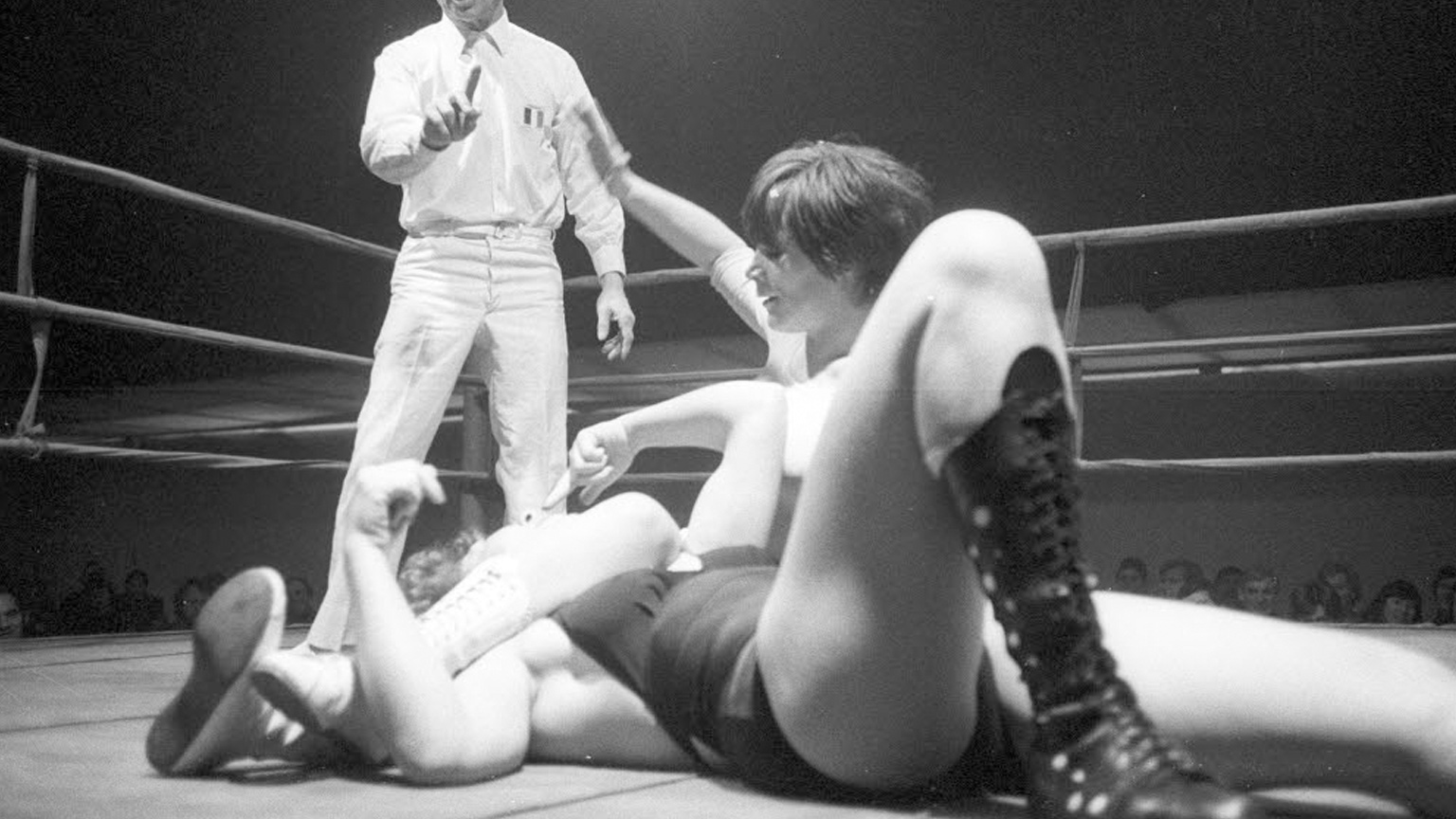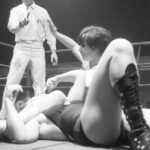The British government kicked the women wrestlers out of London to kick off a 50-year battle against sexism in the wrestling world.
In places like Japan, women’s wrestling was bigger than its male counterpart, with the stars of All Japan Women’s Pro Wrestling proving to be the biggest draws in the country in the 1980s and 1990s.
In America, they had a much tougher time of it, being ignored by the major promotions for decades, before the “Women’s Revolution” in 2015 finally saw the female wrestlers in the WWE be given the chance to shine, and they have main evented WrestleMania multiple times since.
But Britain’s relationship with women’s wrestling is the most interesting of all, as the history of the women’s sport in Great Britain goes all the way back to the 1800s.
The first recorded wrestling match between two female competitors was reported on by the British Press in the 12 November 1823 edition of the publication.

While this was the days before wrestling as a sport turned into the showbiz, “sports entertainment” we know today, it does show us that women were involved in the grappling game going back over 200 years in Britain, almost certainly even longer.
The Newcastle Daily Chronicle reported on July 19th, 1867, that a troupe of German female wrestlers were touring the country, akin to a travelling circus.
This would have been closer to modern professional wrestling, although it is hard to distinguish exactly when it went from a legitimate sport to a dodgy business.
13 years later in Durham, the first male vs female wrestling match was reported, but the sport was still in its infancy.
The work of Jack Carkeek and Georg Hackenschmidt, among others, turned wrestling into a show, with Sir Atholl Oakeley’s invention of “All-in” wrestling bringing huge interest in both male and female wrestling.
Most notably, Ivy “Blonde Tigress” Russell vs Peggy “Brunette Bearcat” Parnell drew thousands of fans in 1934, although the governing bodies had begun to grow tired of the ultra-violent and ungoverned sport that wrestling had become.
But this rich history was about to be derailed. In just four years, women’s wrestling would be banned in London, beginning five decades in the wilderness that would set the sport back generations
London banned wrestling in 1938, but kept the women outlawed when men’s wrestling returned
The introduction of female mud wrestling in the 1930s was the last straw, as the London County Council decreed that All-In wrestling was banned in the capital, seriously denting the sport before World War II would put it out of commission completely.
The bloody and brutal mess that Oakeley’s All-In wrestling became was too much for the city to bear.
Ideas to ban the sport were first floated in 1933, when Conservative MP Sir Leonard Ropner asked the government to consider banning women from the sport completely in a debate on 30 March, 1933.
While this didn’t make it into the House of Lords, London County Council banned women from wrestling in the city in 1938.
This was before they decided to prohibit all-in wrestling in premises licensed by them for both sexes in November 1944.
Other places, such as Goole, Gloucester, and Oxford, stopped All-In wrestling from taking place in their towns completely in 1936, as the male and female sides of the sport. Leeds and Lancashire were other big markets to stop shows being held, and it became de facto banned in venues all across the nation.
The ban was lifted in 1951 with the advent of the Mountevans Rules, a series of rules originally devised by Normal Morrell and used to bring wrestling closer to the sport we know it as today.
These new rules rid the sport of the overly-violent ways of the All-In days, and turned the sport into more of a show than a fight, which helped increase its popularity immensely.
However, this only applied to the male side of the art. Women were still prohibited from competing, with the local councils afraid of the female wrestlers of degrading or demeaning themselves in what was a much different time in Britain.
Women were allowed to wrestle, but not on television
These new rules saw a boom period in British wrestling, as Morrell helped create the new Joint Promotions, a collective of wrestling companies who forged a monopoly over the business, especially after getting the only TV deal in the country showcasing the art in 1965.
On the new World of Sport TV show on ITV, wrestling took centre stage. Stars like Les Kellett, Mick McManus, Big Daddy and Giant Haystacks all become massive stars over the next twenty years, while the women remained sidelined.
While the London ban remained, numerous people at the top refused to showcase women’s wrestling on British TV.
Max Crabtree was vehemently against the idea of women wrestling for his promotion, as he refused to book a single women’s match on television during his reign as head of Joint Promotions.
Additionally, while never put in official terms, ITV simply did not want women featured on their wrestling shows, as legendary Welsh promoter Orig Williams revealed in his book El Bandito.
He admitted that he heard that the broadcaster didn’t want any women on their channel, which is why the Welsh-language channel S4C became the first UK TV channel to show women’s wrestling, on the Williams-run Reslo program.
While Sue Brittain took the wrestling ban to court and won (albeit briefly, the ruling was overturned soon after), there were still tough times ahead in the ring.
Lady wrestlers were relegated to wrestling for “the opposition”
While Joint Promotions refused to book the women wrestlers, often referred to as lady wrestlers, they still competed all over the country for companies outside of the monopoly.
As well as with Orig Williams’ British Wrestling Federation, they were most notably a key part of Brian Dixon’s Wrestling Enterprise, later renamed to All Star Wrestling.
He built his promotion around Mitzi Mueller, his girlfriend and future wife who became one of the key names that put him apart from Big Daddy and Giant Haystacks in his battle against the establishment.
Going against names like Klondyke Kate and Nancy Barton, Mueller drew huge crowds up and down the nation, although she received a less-than-warm welcome from various local councils who sought to shut down events with the ladies competing on.
She became so popular that a riot even broke out when she failed to wrestle on a show in Turkey, while London still upheld the ban on her competing in London, almost five decades after All-In wrestling died in the 1930s.
Her attempt to have an all-women’s match broadcast on TV in 1985 was shot down by the International Broadcasting Authority, once again deciding that lady wrestling had no place on television.
This was something Mueller simply would not stand for.
It took until 1987 for women to be allowed to wrestle in London again, but TV would evade them
Mitzi Mueller began a campaign in the 1980s to get women’s wrestling unbanned by the London council, with some very interesting ways to get the public’s attention.
She attempted to have an all-women’s event shown on TV in 1985, which was filmed, edited and ready to go. However, the Independent Broadcast Authority made the unofficial ban on ladies wrestling officially by kicking them off the box for good.
The Worthing Gazette reported in their Friday 24th August, 1985 issue that “IBA throws Mitzi and her girls off the box”, which angered Mueler in her interview on TV just days later.
So, she decided to release a single, titled “Let the girls in” to drum up public support. Her constant campaigining even managed to actually convince the council, who lifted the half-century ban on women competing in London in professional wrestling matches.
Mitzi Mueller took on the establishment and won. Her final match in wrestling before retiring due to back injuries was her first in the nation’s capital, in a blockbuster tag team bout promoted by her husband.
Yes, it drew horribly and lost a lot of money, with only 5,000 fans turning up to a card which included big names like Kendo Nagasaki, Tony St Clair, and Fit Finlay (half of what Big Daddy drew against “Mighty” John Quinn a few years prior).
But that didn’t matter, because Mueller got the women’s wrestling ban overturned as her final act as a professional.







